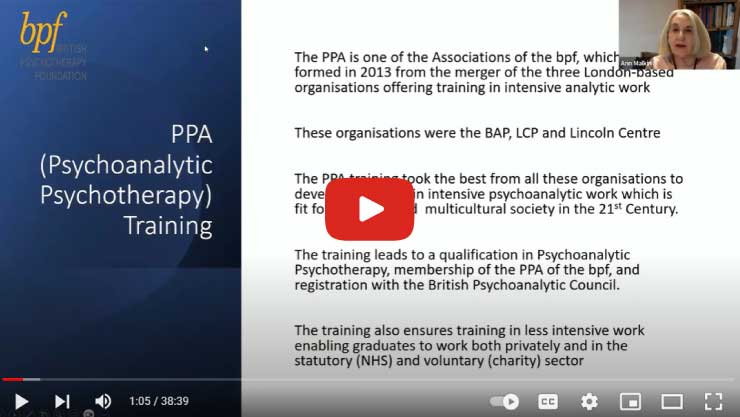
Psychoanalytic Psychotherapy Training (PPA)
Training Location: 37 Mapesbury Road, London NW2 4HJ. Part-time course.
The PPA training incorporates best clinical practice and high standards, and it is accredited by the British Psychoanalytic Council. Once qualified, you will join the Psychoanalytic Psychotherapy Association (PPA) and register for full bpf membership. You will be eligible for registration with the British Psychoanalytic Council, which is regulated by the Professional Standards Authority.
With this training, therapists are well equipped to work intensively and in depth with adult patients in private practice, or to apply the model to work in the NHS, higher education and the third sector. Further training and CPD opportunities are available to all bpf members.
Qualified psychotherapists with the right experience may be eligible for modified entry to this course. See our PPA MES scheme to learn more about the entry requirements.
Application deadline: 2 June 2025
Course starts in January annually.
Email [email protected] for further information on how to apply.
- Course content
- Course structure
- Entry requirements
- Course fees
- Resources
- Access information
- How to apply
The practice of psychoanalytic psychotherapy seeks to explore, understand and work in depth with the emotional problems of another. It necessarily requires a rigorous and thorough training which entails the therapist’s time and commitment and the capacity to explore themselves in their own personal therapy.
Our training is underpinned by a theoretical framework derived from the rich, longstanding and well-founded psychoanalytic traditions of Freud, Klein, Bion, Winnicott and the British Object Relations School. Based on Freud’s discovery and elaboration of the unconscious and its effects in everyday life, the work explores the ways that unconscious aspects and conflicts of the personality may be hindering development and informing conscious choices in an unhelpful way.
Intensive Psychoanalytic Psychotherapy involves seeing a patient three times a week, usually on the couch. This frequency, together with the psychoanalytic setting, enables a depth of contact between therapist and patient that is significant and effective. It is an internationally recognized standard of psychoanalytic work that is also practically manageable in terms of time, costs and the other demands of contemporary life.
Psychoanalytic Psychotherapy allows for a sustained and meaningful therapeutic relationship to develop, enabling both patient and therapist to explore and understand the patient’s difficulties and conflicts in their inner world, in the safe and contained setting of the consulting room. Treatment aims to reach beyond the initial symptoms which may have initiated the desire for therapy, to the underlying causes which reside in deeper layers of the personality. Working in this way can provide profound and lasting change for the patient, and hopefully a rewarding and creative experience for both therapist and patient.
The PPA qualifying course comprises the following strands:
- The trainee’s own personal psychotherapy/analysis at a minimum frequency of 3 times weekly with an approved PPA Training Therapist throughout the training;
- The completion of an Infant Observation for a minimum of 12 months if not already undertaken. This is required before proceeding to take training patients;
- A psychiatric placement undertaken for a minimum of 6 months for those without prior psychiatric experience early in the training;
- A clinical placement will be required for those with limited previous relevant experience;
- In-person attendance and participation in weekly theoretical and clinical seminars, at which trainees are required to present their clinical work for discussion;
- Undertaking clinical work with at least two intensive patients under supervision;
- The submission of six-monthly reports and a final clinical paper.
The theory and clinical seminars are held on Tuesday evenings, between 6.30 – 09:45pm. There are two Saturday seminars per term, with additional plenary sessions with the PPA Training Committee. A further seminar, for those completing an Infant Observation, is attended, at a time to suit the individual during the first year (or two, if a two-year observation is undertaken).
Usually beginning in the second year of the course, trainees begin therapy with the first of two training patients, 3 times weekly. Before qualification one patient must be seen for at least two years, the other for at least 18 months. The trainee submits a report on each patient every 6 months, describing the process of treatment, and attends a seminar once a term to discuss these reports.
The clinical work with each training patient is discussed in one-to-one weekly supervision with a PPA approved Training Supervisor, until qualification.
Theoretical seminars are attended for four years. These provide trainees with a thorough grounding in classical and contemporary psychoanalytical theory. They take place on Tuesday evenings, and on two Saturdays in each term.
Clinical seminars take place weekly until qualification, on the same evening each week as the theoretical seminars. During the first year, these seminars will take the form of weekly work discussions in which trainees present patients or clients with whom they are working in. This might be at an honorary placement in a hospital or counselling setting, or come from professional work that you are already doing. Issues relating to working once weekly, or in a time-limited frame, will be introduced and discussed.
Later in the course, these seminars provide an opportunity to present and discuss the treatment of training patients in a small group with experienced seminar leaders of different psychoanalytic orientations.
Personal Therapy
It is crucial that psychoanalytic psychotherapists have a thorough knowledge of their own emotional conflicts and difficulties in order to be able to work in an appropriately professional way with their patients. We believe that a trainee’s personal psychotherapy is central to their development as a psychotherapist and is a core part of the training.
Therefore, we require trainees to be established in a minimum of 3 times weekly therapy before starting the training and until reaching qualification. This therapy should be undertaken with an approved PPA Training Therapist, which will ensure that the therapy and training are congruent with that which trainees are learning to practice.
If you are not yet in therapy we will assist you in finding a suitable PPA Training Therapist.
Infant observation
This component allows the trainee to gain first-hand experience of the development of an infant and their attachments, and therefore to develop a greater understanding of the early states of mind and human experiences which exist within us all. It also facilitates the development of a capacity to experience and observe intense emotional states both in the mother and baby and in the observer themselves.
Trainees are required to observe a mother and baby in the family setting once a week for an hour. Detailed reports on these observations are written, which are then discussed at a weekly seminar led by an experienced psychotherapist. The observations begin at birth and continue for a one or two years. The length of the observation is agreed with the family at the outset.
A piece of written work on the observation is to be completed before beginning with the first training patient.
Selection
Selection of candidates for training is made solely on the basis of qualities directly concerned with the ability to learn and to function as a psychoanalytic psychotherapist, and each application is carefully considered on a case-by-case basis.
Typically, successful applicants have some experience of working with adults experiencing emotional difficulties within a one-to-one relationship, either professionally or in a volunteer capacity. They may have a degree, however we also accept applications from those able to demonstrate a capacity to undertake the academic components of the course.
An application is likely to be strengthened by having some familiarity with psychoanalytic ideas.
Following acceptance onto the course, those without previous psychiatric experience will need to undertake a psychiatric placement, either before or during the training. Those with little relevant clinical experience will need to undertake a clinical placement, as all trainees need to be engaged in one-to-one therapeutic work with adults during the first pre-clinical year of the training, so that they can participate fully in the weekly clinical seminars.
Undertaking a clinical training in Psychoanalytic Psychotherapy represents a major personal investment in terms of time, finances and individual development. We are currently unable to offer financial support to trainees. However, we review our fees regularly with the aim to keep them as affordable as possible. The bpf does not subsidize transport or accommodation expenses. Personal therapy and supervision are not included in the course fees and must be covered by the trainee.
2025/2026 Course Fees:
The annual fee for the four years of the theory curriculum is £4,244.
| Yr 1 | Yr 2 | Yr 3 | Yr 4 |
| £4,244 | £3,966 | £3,966 | £3,966 |
If clinical work needs to continue beyond the four years, there is a reduction in the annual fee to £1,994.
If an Infant Observation is undertaken during the course, there is an additional fee of £1,653.
Trainees also pay an annual bpf membership fee of £144.45 which provides access to the bpf library, to PEPWEB (an excellent online resource of psychoanalytic literature), and access to bpf’s wide-ranging scientific and cultural life.
The cost of personal therapy is negotiated with the Training Therapist on an individual basis. Similarly, when beginning to work with training patients, the cost of supervision will be discussed with each Training Supervisor. Trainees will need to provide an appropriate setting to see training patients and this may involve room rental costs.
PPA Curriculum
Attend our Virtual Open Day to watch a presentation about this course.

Blogs
How to become a psychotherapist in the UK – The British Psychotherapy Foundation
My Journey as a Black Trainee in Psychodynamic Psychotherapy – The British Psychotherapy Foundation
How Couples Psychotherapy Can Transform Relationships – The British Psychotherapy Foundation
Why become a psychotherapist? (part I)
Why become a psychotherapist? (part II)
Videos
What’s it like to be a psychotherapist? Psychoanalytic psychotherapist (youtube.com)
What’s it like to be a psychotherapist? Child and Adolescent Psychotherapist (youtube.com)
What’s it like to be a psychotherapist? Jungian Analyst (youtube.com)
Contact us at [email protected] to discuss any access requirements.
If you are considering training with the PPA, please email the PPA Training Manager, ([email protected]), who will put you in contact with a PPA Training Advisor (a member of the PPA Training Committee). Before contacting the PPA Training Manager, please ensure you have carefully read the information on the PPA pages of the bpf website including the entry requirements.
PPA Training Advisors can help you prepare to apply, as well as answer questions about the structure, content and cost of the training. If your enquiry is at an early stage, the PPA Training Advisor can offer guidance with regard to the next steps to consider, including how to find an approved training therapist.
The application closing date for the January 2026 intake is 2 June 2025.
The bpf is committed to diversity and inclusivity in all the work we deliver. We are fully dedicated to promoting, maintaining and supporting equality of opportunity in all aspects of our organisation and, as such, the bpf welcomes applications from all sections of society.
We are now accepting applications for membership from current BPC registrants.
Our equivalency pathway for non-BPC registrants to gain membership is currently on hold until September 2025.
New Courses Starting in 2025
Online:
- Psychodynamic and Jungian Theory for Qualified Practitioners (Taught Online)
bpf North:
- Foundation Course (Taught in Newcastle)
- Psychoanalytic & Psychodynamic Psychotherapy Training (Taught in Newcastle & Online)

